大学英语精读(第三版)第2册第4课教案
大学英语精读第三版第二册教案

教学目标:1. 通过阅读课文,掌握文章的基本内容和结构。
2. 培养学生阅读理解能力和英语表达能力。
3. 提高学生的词汇量和语法水平。
4. 培养学生自主学习和合作学习的习惯。
教学重点:1. 课文主要内容和结构。
2. 课文中的重点词汇和短语。
3. 课文的语法结构。
教学难点:1. 课文中的长难句理解。
2. 课文中抽象概念的理解。
3. 课文中的词汇和短语运用。
教学工具:1. 多媒体课件2. 课文原文3. 生词表4. 语法讲解资料教学过程:一、导入1. 教师简要介绍课文背景,激发学生的学习兴趣。
2. 引导学生思考课文可能涉及的主题和内容。
二、课文阅读1. 学生自读课文,初步了解文章大意。
2. 教师提问,检查学生对课文内容的理解。
3. 学生分组讨论,进一步分析课文结构。
三、词汇学习1. 教师讲解课文中的重点词汇和短语,提供例句。
2. 学生跟读并模仿例句,巩固词汇。
3. 学生完成词汇练习,检验学习效果。
四、语法讲解1. 教师讲解课文中的语法结构,结合例句进行讲解。
2. 学生跟读并模仿例句,巩固语法知识。
3. 学生完成语法练习,检验学习效果。
五、课文翻译1. 学生分组进行课文翻译,相互检查和纠正。
2. 教师选取部分段落进行点评和讲解。
六、课堂小结1. 教师总结本节课的重点内容和难点,强调学习要点。
2. 学生分享学习心得,提出疑问。
七、课后作业1. 学生完成课后阅读练习。
2. 学生翻译课文中的长难句。
3. 学生预习下一节课内容。
教学反思:1. 教师应根据学生的学习情况,调整教学方法和手段,提高教学效果。
2. 鼓励学生积极参与课堂活动,培养学生的自主学习能力。
3. 关注学生的学习进度,及时调整教学计划,确保教学目标的实现。
教学课时:2课时备注:本教案仅供参考,教师可根据实际情况进行调整。
(完整版)新视野大学英语第三版第二册第四课教案
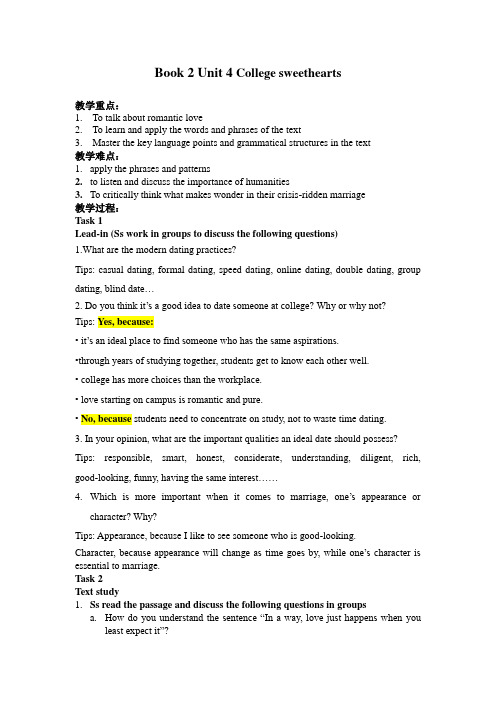
Book 2 Unit 4 College sweethearts教学重点:1.To talk about romantic love2.To learn and apply the words and phrases of the text3.Master the key language points and grammatical structures in the text教学难点:1.apply the phrases and patterns2.to listen and discuss the importance of humanities3.To critically think what makes wonder in their crisis-ridden marriage教学过程:Task 1Lead-in (Ss work in groups to discuss the following questions)1.What are the modern dating practices?Tips: casual dating, formal dating, speed dating, online dating, double dating, group dating, blind date…2. Do you think it’s a good idea to date someone at college? Why or why not?Tips: Yes, because:• it’s an ideal place to find someone who has the same aspirations.•through years of studying to gether, students get to know each other well.• college has more choices than the workplace.• love starting on campus is romantic and pure.• No, because students need to concentrate on study, not to waste time dating.3. In your opinion, what are the important qualities an ideal date should possess? Tips: responsible, smart, honest, considerate, understanding, diligent, rich, good-looking, funny, having the same interest……4.Which is more important when it comes to marriage, one’s appearance orcharacter? Why?Tips: Appearance, because I like to see someone who is good-looking. Character, because appearance will change as time goes by, while one’s character is essential to marriage.Task 2Text study1.Ss read the passage and discuss the following questions in groupsa.How do you understand the sentence “In a way, love just happens when youleast expect it”?b.Why did the author think that Butch seemed a little weired although very cute?c.Why did fear come over the author whem she started to fall in love?nguage focus1) New words: gaze, dynamic, proceed, coordinate, confess, commence,disapprove, tempt, deserve2) Phrasesa. Sth.(a feeling) comes over sb. when sb. does sth.用于表达“某人在特定情境下突然受到某种情感的影响”。
大学英语精读二册4课(中英对照)

大学英语精读二册4课(中英对照)UNIT 4. My First JobTrying to make some money before entering university, the author applies for a teaching job. But the interview面试goes from bad to worse...为了想在进大学前赚些钱,作者申请了一份教职。
但面试情况却越来越糟……My First Job我的第一份工作While I was waiting to enter university, I saw advertised in a local newspaper地方报纸a teaching post教学职位at a school in a suburb郊区of London about ten miles from where I lived. Being very short money and wanting to do something useful, I applied 申请, fearing as I did so, that without a degree and with no experience in teaching my chances of getting the job were slim 微薄.在我等着进大学期间,我在一份地方报纸上看到一则广告,说是在离我住处大约十英里的伦敦某郊区,有所学校要招聘一名教师。
我因为手头很拮据,同时也想做点有用的事,于是便提出了申请,但在提出申请的同时我也担心,自己一无学位,二无教学经验,得到这份工作的可能性是微乎其微的。
However, three days later a letter arrived, asking me to go to Croydon for an interview. It proved an awkward 尴尬的journey: a train to Croydon station; a ten-minute bus ride and then a walk of at least a quarter .As a result I arrived on a hot June morning too depressed沮丧的to feel nervous. too...to...表示太……而不能……然而,三天之后,却来了一封信,叫我到克罗伊登去面试。
新视野大学英语第三版电子教案Book2Unit4
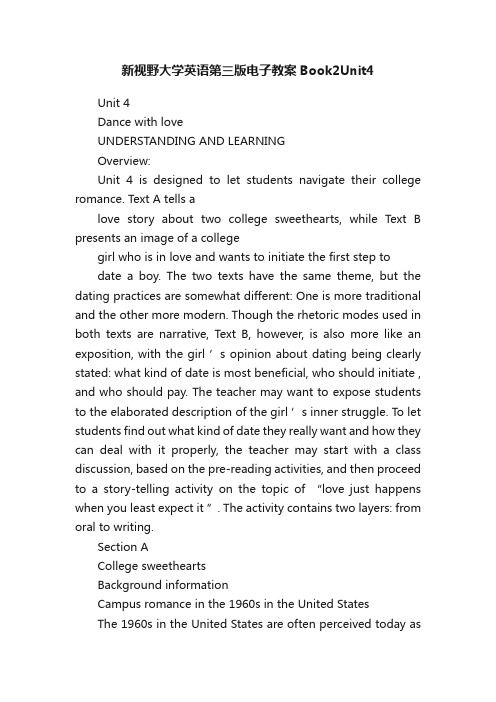
新视野大学英语第三版电子教案Book2Unit4Unit 4Dance with loveUNDERSTANDING AND LEARNINGOverview:Unit 4 is designed to let students navigate their college romance. Text A tells alove story about two college sweethearts, while Text B presents an image of a collegegirl who is in love and wants to initiate the first step todate a boy. The two texts have the same theme, but the dating practices are somewhat different: One is more traditional and the other more modern. Though the rhetoric modes used in both texts are narrative, Text B, however, is also more like an exposition, with the girl ’s opinion about dating being clearly stated: what kind of date is most beneficial, who should initiate , and who should pay. The teacher may want to expose students to the elaborated description of the girl ’s inner struggle. To let students find out what kind of date they really want and how they can deal with it properly, the teacher may start with a class discussion, based on the pre-reading activities, and then proceed to a story-telling activity on the topic of “love just happens when you least expect it ”. The activity contains two layers: from oral to writing.Section ACollege sweetheartsBackground informationCampus romance in the 1960s in the United StatesThe 1960s in the United States are often perceived today asa period of profound societal change. Attitudes toa variety of issues changed, sometimes radically, throughout the decade. The urge to“find oneself ”, the activism ofthe 1960s, and the quest for autonomy were characterized by changes toward sexual attitudes and practices,particularly among the young. These changes to sexual attitudes and behavior during the period are often referred to as the “sexual revolution ”. The sexual revolution was often seen to have been centered on the university campus, among students. While the term“revolution ”implies radical and widespread change, this was not necessarily in the case. Even in the “liberal ”1960s, conservative and traditional views were widely held. The love story in Text A coincides with what happened in that particular historical period of time in the United States. From the story students can see the main characters, college sweethearts back then, were actually following a more traditional pattern of dating, romantic but conservative, a clear stream on campus in the 1960s.Detailed study of the text1.I smile at my two lovely daughters and they seem so much more mature than we,their parents, when we were college sweethearts. (Para. 1)Meaning beyond words: Married to her college sweethearts, the author now is happy with her family and two grown daughters.2. Linda, who ’s 21, had a boyfriend in her freshman year she thought she would marry, but they are not together anymore. Melissa, who ’s 19, hasn’thad a steady boyfriend yet. Mydaughters wonder when they meet “The One”, their great love. (Para. 1)2.Meaning beyond words: Her two daughters are at the age of just dating, but they seemto be very mature wondering when they will meet their true love.13. They think their father and I had a classic fairy-tale romance heading for marriage from the outset. (Para. 1) Meaning beyond words: Her daughters consider their parents ’marriage a typical conve ntional romance because they think it aimed at marriage from the very beginning. ★ classic: a.(usu. before noun) admired by many people, and having a value that has continued for a long time 经典的The Coca-Cola bottle is one of the classic designs of the last century. 可口可乐瓶子上是上个世纪的经典设计之一。
大学英语精读第二册课件Unit 4
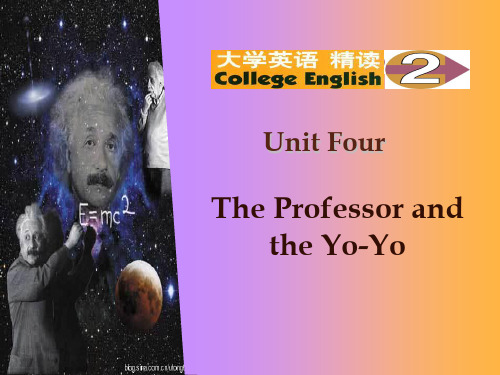
He was so slow that he did not learn how to talk until he was two years old. He could barely pronounce the words without mouthing them silently first. All of his teachers thought that he would never succeed.
Home
The Professor and the Yo-Yo
D
Contributions & Achievements
• mass–energy equivalence formula E = mc2
• 能量守恒定律 (质能方程)
• Equation for his special theory of relativity.
Topic Introduction
Spot Dictation
1
2
3
Warm-up Questions
Home
The Professor and the Yo-Yo
Topic Introduction
The text is about…
Albert Einstein 阿尔伯特·爱因斯坦
大学英语读写2第三版unit4教案

一、教学目标1. 让学生了解旅游的意外目的,培养学生的阅读和写作能力;2. 通过本单元的学习,使学生能够运用英语谈论旅游的意外目的,并能将所学知识运用到实际生活中;3. 提高学生的词汇、语法、句型和篇章结构等方面的综合运用能力。
二、教学内容Unit 4: The Surprising Purpose of Travel三、教学重点与难点1. 教学重点:理解文章主旨,掌握文章结构,学习并运用相关词汇和句型;2. 教学难点:把握文章主旨,理解作者观点,提高阅读速度和理解能力。
四、教学过程1. 导入新课(1)播放一段关于旅游的短视频,激发学生的学习兴趣;(2)引导学生思考:旅游的真正目的是什么?2. 预习课文(1)学生快速阅读课文,了解文章大意;(2)教师提问,检查学生的预习效果。
3. 课文讲解(1)分析文章结构,讲解文章主旨;(2)分析作者观点,引导学生思考;(3)讲解相关词汇和句型,提高学生的词汇和语法水平。
4. 课堂活动(1)小组讨论:结合自身经历,谈谈旅游的意外目的;(2)角色扮演:模拟旅游场景,运用所学知识进行对话;(3)写作训练:以“旅游的意外目的”为主题,写一篇短文。
5. 课堂小结(1)回顾本节课所学内容,总结重点和难点;(2)布置课后作业,巩固所学知识。
五、教学评价1. 课堂表现:观察学生在课堂上的参与度、积极性;2. 预习效果:检查学生的预习情况,了解学生对课文内容的掌握程度;3. 课堂活动:评估学生在课堂活动中的表现,如小组讨论、角色扮演等;4. 课后作业:检查学生的写作练习,了解学生的写作水平。
六、教学反思1. 教师应关注学生的个体差异,因材施教;2. 采用多种教学方法,激发学生的学习兴趣;3. 注重培养学生的阅读和写作能力,提高学生的英语综合素养。
新视野大学英语(第三版)读写教程Book2-Unit4-电子教案
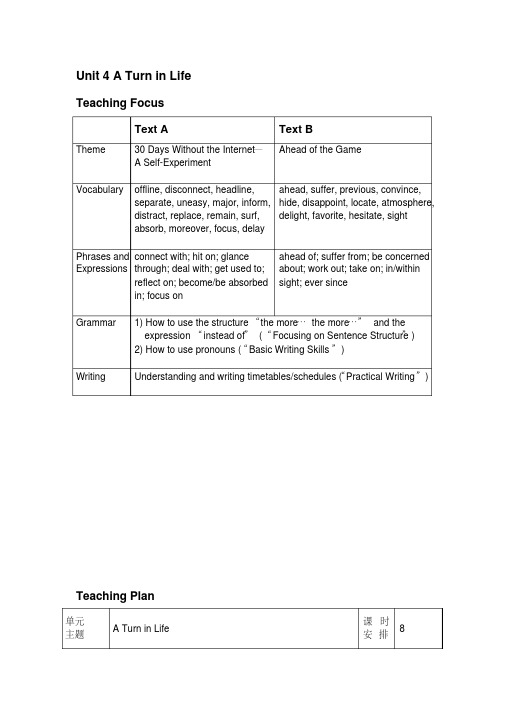
Unit 4 A Turn in LifeTeaching FocusText A Text BTheme30 Days Without the Internet—A Self-ExperimentAhead of the GameVocabulary offline, disconnect, headline,separate, uneasy, major, inform,distract, replace, remain, surf,absorb, moreover, focus, delay ahead, suffer, previous, convince, hide, disappoint, locate, atmosphere, delight, favorite, hesitate, sightPhrases and Expressions connect with; hit on; glancethrough; deal with; get used to;reflect on; become/be absorbedin; focus onahead of; suffer from; be concernedabout; work out; take on; in/withinsight; ever sinceGrammar 1) How to use the structure “the more…the more…”and theexpression “instead of”(“Focusing on Sentence Structure”)2) How to use pronouns (“Basic Writing Skills”)Writing Understanding and writing timetables/schedules (“Practical Writing”) Teaching Plan单元主题A Turn in Life课时安排8教育教学目标(学生) To learn the difficulty in fighting the addiction to the Internet and try to develop a good habit of using the Internet.To learn to be positive and helpful.To be familiar with the context meaning and the use of those vocabulary of the two texts listed in the above table.To be familiar with the collocation of those phrases and expressions listed in the above table.To be able to make sentences with deal with, focus on, every now and then, and be used to.To be able to rewrite sentences after models, using the structure “the more…, the more” or the expression of “instead of”.To learn some rules of using pronouns.To be able to understand and write a timetable/schedule.教学设计教学内容Section AText A: 30 Days Without the Internet—A Self-ExperimentSection BText B: Ahead of the GameSection CPractical Writing: Understanding and Writing Timetables/ Schedules教学活动安排建议Leading In and Exploring the TopicAsk the Ss to work in small groups to discuss the questionslisted in the exercise of Exploring the Topic on P60 of SB.Elicit answers from some students and give them helps wherenecessary.Then give the Ss 5 minutes to discuss the following threequestions:1)What do you usually use the Internet for?2)What will you do if you can’t access the Internet for morethan a week?3)What benefits can you think of to live without theInternet?Ask some representatives to share their groups’ opinion withthe class.Section A Reading ThroughShow the class the text structure on P127 of TB with PPT andallow them 5 minutes to look through the text with thestructure in mind.Give the Ss 10 minutes to read Para.2 to Para.8 again carefullyand try to find the answer to the following 4 questions:1) How did the author feel during the first week of theexperiment?2) What did the author do to distract himself?3) How did the author get used to the life without theInternet?4) What are the advantages of being disconnected from theInternet?Ask some students to share their answers with the class. Givethem some help where necessary.Highlight some difficult sentences and elicit explanationsfrom students and give helps where necessary.Basic Writing SkillsPrepare a PPT with sentences of the exercise on P69 to P70 ofSB.Ask some students to tell their answers to the class andexplain why.Check the understanding of the class by explaining theexamples given on P69 of SB.Section B Reading MoreAsk the students t o read and be familiar with the content of Text B.Pair up the Ss in class and allow them 10 minutes to discuss the following questions:1) What is the author’s friend suffering from? Why?2) What did the author’s friend like to do when they were incollege?3) What did the author’s friend receive one day?4) What words did his friend find on it?5) What did his friend do at last?6) What will you do if you are the friend?7) What will you do if you the author?Encourage some volunteers to share their ideas with the class. Section C Practical WritingGuide the students to finish the three exercises on P76 to P77 of SB according to the samples given.Ask each student to write a Chinese schedule for next week and then write an English one according to the Chinese one.课后学习设计作业(学生) Finish all the exercises in Unit Four.Read the passage in Reading Out on P64 of SB and recite it.List some other ways to fight Internet addiction besides the ones used in Text A.Write yourself an English schedule for next week.课后总结与反思(教师)。
大学英语精读Book2 Unit4
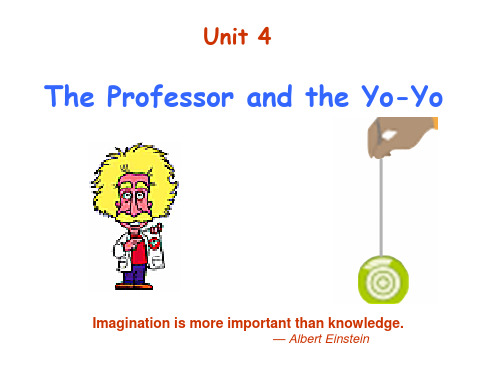
2.To whom are the awards granted?
KEY
3.When were the first Nobel Prizes awarded?
KEY
on December 10, 1901, the fifth anniversary of Nobel’s death; in the captial of Sweden, Stockholm.
Unit 4
The Professor and the Yo-Yo
Imagination is more important than knowledge.
— Albert Einstein
Background Information Discourse Analysis
Language Points
II. Text Analysis:
The Professor and The Yo-Yo
Question: Why is the text entitled “The Professor and the Yo-Yo”?
⑴ An appealing title arouses readers’ interests
II. Background Information---Einstein:
1940
He became a United States citizen. Declined an offer to become president of Israel.
November 18,1952
April 18, 1955
1919
II. Background Information---Einstein:
1921
新视野大学英语第三版第二册Unit4教案

课程名称:新视野大学英语第三版第二册单元主题:What’s the big idea?教学目标:1. 培养学生运用语音、体态语言和视觉辅助工具进行有效演讲的能力。
2. 提高学生的听力理解能力,学会预测听力材料主题和关键词汇。
3. 增强学生的口语表达能力,学会在头脑风暴中提出观点并评论他人观点。
4. 培养学生谈论发明和创新思维的能力。
5. 让学生能够清晰、流畅地表达自己的商业想法。
教学重点:1. 语音、体态语言和视觉辅助工具在演讲中的运用。
2. 听力理解技巧,包括预测主题和关键词汇。
3. 口语表达技巧,包括头脑风暴和评论他人观点。
4. 发明和创新思维的探讨。
5. 商业想法的表达。
教学难点:1. 语音、体态语言和视觉辅助工具在演讲中的综合运用。
2. 听力理解中关键词汇的预测和把握。
3. 口语表达中的逻辑性和连贯性。
4. 商业想法的清晰性和说服力。
教学方法:1. 案例分析法:通过分析优秀演讲案例,引导学生掌握演讲技巧。
2. 小组讨论法:让学生在小组内进行头脑风暴,提出观点并评论他人观点。
3. 角色扮演法:让学生扮演不同角色,模拟实际场景,提高口语表达能力。
4. 任务驱动法:通过设计具体任务,引导学生运用所学知识进行实践。
教学步骤:一、导入1. 教师展示一些世界最差发明图片,引导学生讨论为什么这些发明被列入“世界最差发明”名单。
2. 引出单元主题:What’s the big idea?(什么是个大想法?)二、新课导入1. 学生阅读课文,了解单元主题和相关词汇。
2. 教师讲解重点词汇和语法结构。
3. 学生进行词汇和语法练习。
三、听力训练1. 学生听录音,预测听力材料主题和关键词汇。
2. 学生听录音,回答问题,检验听力理解能力。
3. 教师讲解听力材料,分析关键词汇和句子结构。
四、口语表达训练1. 学生进行头脑风暴,提出关于发明的创意想法。
2. 学生分组讨论,评论他人观点,并提出自己的看法。
3. 学生进行角色扮演,模拟实际场景,提高口语表达能力。
新视野大学英语第三版第二册第四课教案
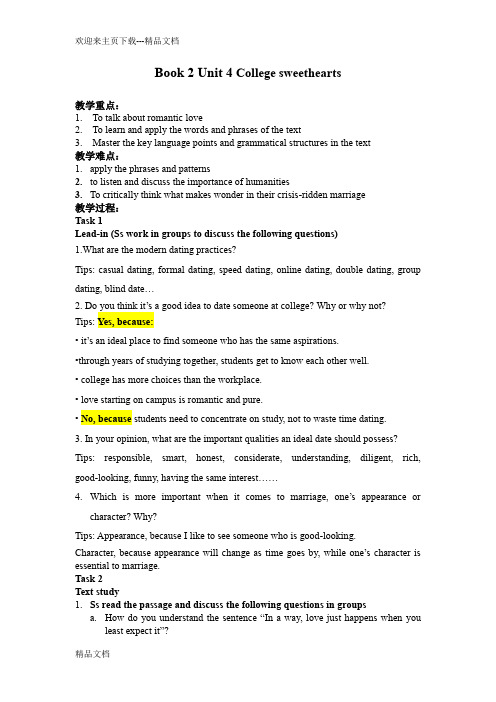
Book 2 Unit 4 College sweethearts教学重点:1.To talk about romantic love2.To learn and apply the words and phrases of the text3.Master the key language points and grammatical structures in the text教学难点:1.apply the phrases and patterns2.to listen and discuss the importance of humanities3.To critically think what makes wonder in their crisis-ridden marriage教学过程:Task 1Lead-in (Ss work in groups to discuss the following questions)1.What are the modern dating practices?Tips: casual dating, formal dating, speed dating, online dating, double dating, group dating, blind date…2. Do you think it’s a good idea to date someone at college? Why or why not?Tips: Yes, because:• it’s an ideal place to find someone who has the same aspirations.•through years of studying to gether, students get to know each other well.• college has more choices than the workplace.• love starting on campus is romantic and pure.• No, because students need to concentrate on study, not to waste time dating.3. In your opinion, what are the important qualities an ideal date should possess? Tips: responsible, smart, honest, considerate, understanding, diligent, rich, good-looking, funny, having the same interest……4.Which is more important when it comes to marriage, one’s appearance orcharacter? Why?Tips: Appearance, because I like to see someone who is good-looking. Character, because appearance will change as time goes by, while one’s character is essential to marriage.Task 2Text study1.Ss read the passage and discuss the following questions in groupsa.How do you understand the sentence “In a way, love just happens when youleast expect it”?b.Why did the author think that Butch seemed a little weired although very cute?c.Why did fear come over the author whem she started to fall in love?nguage focus1) New words: gaze, dynamic, proceed, coordinate, confess, commence,disapprove, tempt, deserve2) Phrasesa. Sth.(a feeling) comes over sb. when sb. does sth.用于表达“某人在特定情境下突然受到某种情感的影响”。
大学英语精读2第二册教案

课程名称:大学英语精读课程内容:《大学英语精读2》第二册教学目标:1. 帮助学生掌握课文中的词汇和短语。
2. 提高学生的阅读理解能力。
3. 培养学生的写作和翻译技能。
4. 增强学生的口语表达能力。
教学时间:2课时教学重点:1. 词汇和短语的理解与运用。
2. 阅读理解的技巧。
3. 写作和翻译的基本方法。
教学难点:1. 词汇和短语的深度理解。
2. 阅读理解的准确性。
3. 写作和翻译的技巧。
教学准备:1. 课件:课文文本、词汇表、语法讲解、练习题等。
2. 教学工具:黑板、多媒体设备、课本等。
教学过程:第一课时一、导入1. 复习上节课的内容,检查学生的掌握情况。
2. 引入本节课的课文标题,简要介绍作者和背景。
二、词汇教学1. 逐词讲解课文中的重点词汇,包括其含义、用法和搭配。
2. 通过例句和练习,帮助学生巩固词汇。
三、语法讲解1. 讲解课文中的语法点,如时态、语态、非谓语动词等。
2. 通过例句和练习,帮助学生理解和运用语法知识。
四、阅读理解1. 预习课文,让学生对课文内容有一个大致的了解。
2. 阅读课文,指导学生分析文章结构、段落大意和主题思想。
3. 解答阅读理解练习题,巩固阅读技巧。
五、课堂小结1. 回顾本节课的学习内容,总结重点和难点。
2. 布置课后作业,包括词汇练习、阅读理解、写作和翻译等。
第二课时一、复习1. 复习上节课的课文内容,检查学生的掌握情况。
2. 介绍课后作业的完成情况。
二、写作教学1. 讲解写作技巧,如文章结构、段落发展、过渡句等。
2. 指导学生根据课文内容,撰写一篇短文。
三、翻译教学1. 讲解翻译技巧,如直译、意译、词义转换等。
2. 指导学生翻译课文中的段落或句子。
四、口语表达1. 组织学生进行口语练习,如角色扮演、小组讨论等。
2. 指导学生运用所学词汇和语法知识,进行口语表达。
五、课堂小结1. 回顾本节课的学习内容,总结重点和难点。
2. 布置课后作业,包括写作、翻译和口语练习等。
现代大学英语(精读)2--lesson4
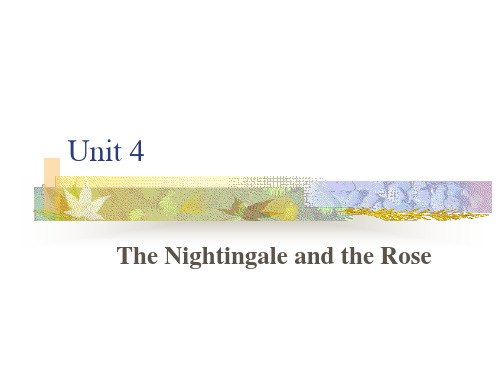
2. for want of: for the lack of For want of a better word, let’s call it Mefirstism. (As I can’t think of a better word, let’s call it me-firstism.) For want of something better to do she decided to try gardening. (As she could not find anything more interesting to do, she decided to try gardening.)
Quotes from Wilde
We are each our own devil, and we make this world our hell. The Duchess of Padua. The world is a stage, but the play is badly cast. Lord Arthur Savile's Crime. To love oneself is the beginning of a life-long romance. Phrases and Philosophies for the Use of the Young. Young men want to be faithful and are not; old men want to be faithless and cannot. The Picture of Dorian Gray.
Oscar O’Wilde
(1854-1900)
Oscar O’Wilde
新视野大学英语第三版读写教程第二册Unit4-College-sweethearts课文语法讲解
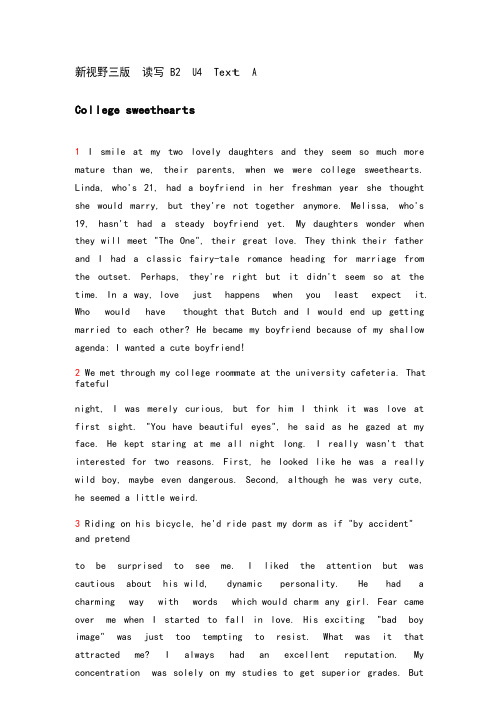
新视野三版读写B2U4T e x t AC o ll e g e s w ee t h ea r t s1 I smile at my two lovely daughters and they seem so much more mature than we, their parents, when we were college sweethearts. Linda, who's 21, had a boyfriend in her freshman year she thought she would marry, but they're not together anymore. Melissa, who's 19, hasn't had a steady boyfriend yet. My daughters wonder when they will meet "The One", their great love. They think their father and I had a classic fairy-tale romance heading for marriage from the outset. Perhaps, they're right but it didn't seem so at the time. In a way, love just happens when you least expect it. Who would have thought that Butch and I would end up getting married to each other? He became my boyfriend because of my shallow agenda: I wanted a cute boyfriend!2 We met through my college roommate at the university cafeteria. That fatefulnight, I was merely curious, but for him I think it was love at first sight. "You have beautiful eyes", he said as he gazed at my face. He kept staring at me all night long. I really wasn't that interested for two reasons. First, he looked like he was a really wild boy, maybe even dangerous. Second, although he was very cute,he seemed a little weird.3 Riding on his bicycle, he'd ride past my dorm as if "by accident"and pretendto be surprised to see me. I liked the attention but was cautious about his wild, dynamic personality. He had a charming way with words which would charm any girl. Fear came over me when I started to fall in love. His exciting "bad boy image" was just too tempting to resist. What was it that attracted me? I always had an excellent reputation. My concentration was solely on my studies to get superior grades. Butfor what? College is supposedto be a time of great learning and also some fun. I had nearly achieved a greateducation, and graduation was just one semester away. But I hadn't had any fun; my life was stale with no component of fun! I needed a just any had to be cute. My goal that semester became: Be ambitious and grab the cutest boyfriend I can find.4 I worried what he'd think of me. True, we lived in a time when a dramatic shiftin sexual attitudes was taking place, but I was a traditional girl who wasn't ready for the new waysthatseemed common on campus. Butch looked superb! I was not immune to his personality, but I was scared. The night when he announced to the world that I was his girlfriend, I went alongwith him. And then I suddenly thought: "Oh my gosh! Am I his girlfriend? How did that happen?" Then he whispered sweet words in my ear and said, "I'm going to marry you one day and I will be a lawyer. You will see."5 I was laughing inside and said to myself, "I'd never marry this guy. He's a rebel without a good future. He's my boyfriend because I hate my boring student life. I just want to have fun."6 Sure enough, the following month, I found out he had failed all hiscourses. Consequently, he was going to be expelled from the university. To my disgust, he seemed resigned to his fate. I knew there was hope, so I led him to the college secretary for reconsideration.7 "You are going to graduate with a BA in politicalsciencefrom UPenn and proceed to the College of Law," I told him, lodging an appeal on his behalf, which was approved. Butch was granted reconsideration. And, once we became steadies, he coordinated his studies and social life, passingall of his classes. He eventually studied law.8 Despite Butch's somewhat wild character, at his core, he is alwaysa perfect gentleman and deserves a lot of credit for , he'd sometimes take the liberty of displaying his love by planting a kiss on my lips right in front of my astonished friends who watched and disapproved. But the truth is we had a pure and responsible relationship for seven full years. Sitting by the palm trees, hand in hand, we would listen to romantic songs, watch the sunset, and weave dreams of being together with children of our own, forever.9 Two years passed in a blur. One day, Butch took me by surprise ashe knelt down and proposed marriage holding a dozen red roses!Filled with deep emotion, I confessed my love for him, "How roooomaaaantic!!" Then my brain woke up from fantasy land. I cried out, "Good heavens. No! We're too young to tie the knot. We haven't even graduated from college yet!" I really loved him but was pessimistic about our chances for success.10 We married five years later.11 Our faithful journey of love and learning took us down rocky roads of hardship and on smooth easy-going highways. It is a long, romantic, sometimes crazy, love story that sums up a 29-year long honeymoon togetheras a couple who are still madly in love with each other. Our love commenced with a casual attraction but bloomed into a mature love and rich life.L a ngu a g e P o i n t s:1I s m il e a t m y t w o l o v e l y d a ugh t e r s a nd t h e y s ee m s o m u c h m o r e m a t u r e t h a n w e, t h e i r p a r e n t s,w h e n w e w e r e c o ll e g e s w ee t h ea r t s.(Pa r a.1)Mea n i ng b e y ond w o r d s:Married to her college sweetheart,the author now is happy with her family and two grown daughters.N o t e:College sweethearts refer to someone with whom one is in love and by whom oneis loved at college;sweetheart is equivalent to lover,darling,beloved,or dear.For example:Well done,sweetheart,we are all so proud of you.做得好,宝贝,我们以你为荣。
大学英语精读第三版第二册教案
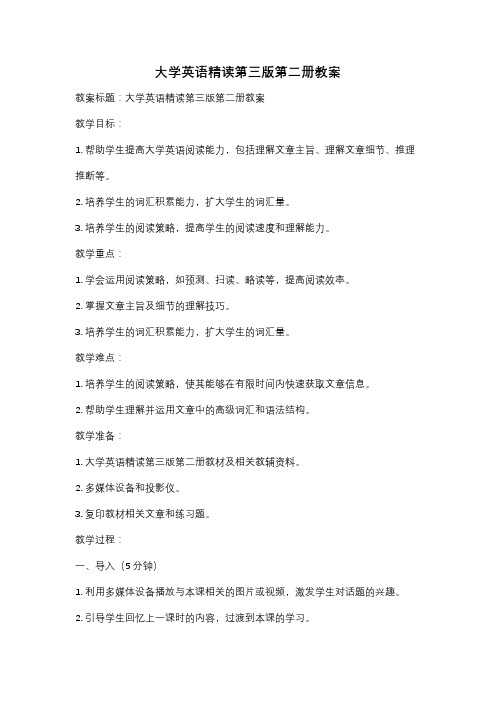
大学英语精读第三版第二册教案教案标题:大学英语精读第三版第二册教案教学目标:1. 帮助学生提高大学英语阅读能力,包括理解文章主旨、理解文章细节、推理推断等。
2. 培养学生的词汇积累能力,扩大学生的词汇量。
3. 培养学生的阅读策略,提高学生的阅读速度和理解能力。
教学重点:1. 学会运用阅读策略,如预测、扫读、略读等,提高阅读效率。
2. 掌握文章主旨及细节的理解技巧。
3. 培养学生的词汇积累能力,扩大学生的词汇量。
教学难点:1. 培养学生的阅读策略,使其能够在有限时间内快速获取文章信息。
2. 帮助学生理解并运用文章中的高级词汇和语法结构。
教学准备:1. 大学英语精读第三版第二册教材及相关教辅资料。
2. 多媒体设备和投影仪。
3. 复印教材相关文章和练习题。
教学过程:一、导入(5分钟)1. 利用多媒体设备播放与本课相关的图片或视频,激发学生对话题的兴趣。
2. 引导学生回忆上一课时的内容,过渡到本课的学习。
二、预习导入(10分钟)1. 让学生自主阅读课文标题、段落标题和图片等,预测文章内容。
2. 鼓励学生提出问题并讨论,激发学生的思考和好奇心。
三、阅读训练(30分钟)1. 分段教学,引导学生通过扫读和略读等阅读策略快速获取文章主旨和细节信息。
2. 针对每个段落的重点句子和难点词汇进行解读和讲解。
3. 组织学生进行小组讨论,分享对文章的理解和感受。
四、词汇拓展(15分钟)1. 教师呈现并讲解本课文章中的重点词汇和短语。
2. 组织学生进行词汇拓展活动,如词义辨析、词汇运用等。
五、语法点讲解(10分钟)1. 教师讲解本课文章中的重点语法结构,并与学生一起进行练习。
2. 引导学生在阅读中注意语法结构的运用和理解。
六、练习与巩固(15分钟)1. 分发练习题,让学生进行阅读理解和语法填空等练习。
2. 引导学生相互检查答案,并进行讲解和讨论。
七、总结与反思(5分钟)1. 教师对本课的教学进行总结,强调重点和难点。
2. 鼓励学生提出问题和反思,促进学生对学习的思考和反思。
大学英语精读(第三版)第2册 第 4 课教案
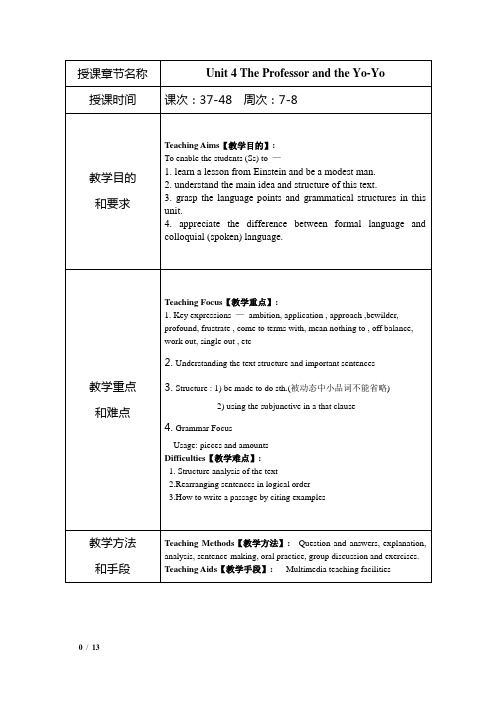
授课章节名称 授课时间
Unit 4 The Professor and the Yo-Yo 课次:37-48 周次:7-8
4. Grammar Focus
Usage: pieces and amounts Difficulties【教学难点】: 1. Structure analysis of the text 2.Rearranging sentences in logical order 3.How to write a passage by citing examples
教学重点 和难点
2. Understanding the text structure and important sentences 3. Structure : 1) be made to do sth.(被动态中小品词不能省略)
2) using the subjunctive in a that clause
Teaching Focus【教学重点】: 1. Key expressions — ambition, application , approach ,bewilder, profound, frustrate , come to terms with, mean nothing to , off balance, work out, single out , etc
Teaching Aims【教学目的】: To enable the students (Ss) to —
教学目的 和要求
大学英语精读第二册第四课课件

Text interpretation
Answer the questions
Comprehension Ex 2 on p.83
What type is the text, generally? A. narration B. exposition C. description D. argumentation
The Professor and the Yo-yo
Useful expressions Text interpretation Word family Sentence structure Translation Reading skill Guided writing Homework
Useful expressions
适中的价格 减轻疼痛 液晶显示器 保持平衡 环球旅行 简体中文 知识分子 A modest price Ease the pain LCD Keep balance Universal travel Simplified Chinese Intellectuals
Useful expressions
Hale Waihona Puke Text interpretation
9. He was beyond any pretension. 10. Material things meant nothing to him. 11. He believed in simplicity, so much so that… 12. When I suggested that he try shaving cream… 13. …I presented him with a tube of shaving cream. 14. … he was beaming with the pleasure of… 15. Then he reverted to using plain water. 16. He didn’t have the slightest interest in … 17. …a toy, a bird that balanced on the edge of a bowl of water…
大学英语精读第二册(第三版)Unit4答案
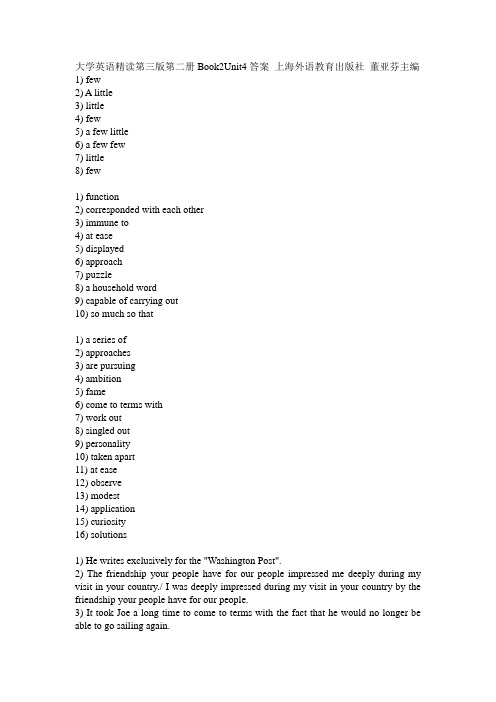
大学英语精读第三版第二册Book2Unit4答案上海外语教育出版社董亚芬主编1) few2) A little3) little4) few5) a few little6) a few few7) little8) few1) function2) corresponded with each other3) immune to4) at ease5) displayed6) approach7) puzzle8) a household word9) capable of carrying out10) so much so that1) a series of2) approaches3) are pursuing4) ambition5) fame6) come to terms with7) work out8) singled out9) personality10) taken apart11) at ease12) observe13) modest14) application15) curiosity16) solutions1) He writes exclusively for the "Washington Post".2) The friendship your people have for our people impressed me deeply during my visit in your country./ I was deeply impressed during my visit in your country by the friendship your people have for our people.3) It took Joe a long time to come to terms with the fact that he would no longer be able to go sailing again.4) Jim's grandfather believes more in fresh air and exercise than in medicine.5) Owing to his poor education he was frustrated in his attempt to find a good job.6) Most American cities are relatively small in terms of population when compared to Chinese cities like Shanghai and Beijing.1) emotional2) angry3) atomic4) exclusive5) famous6) jealous7) safe8) simple9) important10) valuable11) central12) delightful/delighted13) feasible14) fortunate15) personal16) capable17) sandy18) original19) curious20) easy1) typewriter2) honeymoon3) airport4) schoolmaster5) necklace6) eyesight7) loudspeaker8) sunrise9) heartbeat10) blood-test11) motorcycle12) crossroad13) spaceship14) superpower15) lifeboat16) rainstorm1) handbook/handmade/handsaw/handshake/handwork/handwriting2) housebreaker/housekeep/housekeeper/house arrest/housemate/housework3) workbook/workday/workmate/workshop/worksite/worktable4) bookkeeper/bookmark/book review/bookseller/bookshelf/bookstall5) riverside/roadside/bedside/dockside/inside/outside6) classroom/living room/reading room/waiting room/consulting room/dark room1) a drop of blood2) a grain of wheat3) a length of rope4) a lump of sugar5) a ball of string6) a block of marble7) a roll of toilet paper8) a helping of pie9) a blanket of heavy mist10) a slice of beef1) Joe's father was seen to return after dark.2) The wind was heard to roar through the trees.3) I don't think Tom can be made to take the boss's orders.4) The young man was seen to enter the building next to the bank.5) When she was in Shanghai the actress was heard to say she had long thought of this city as her second home.6) After the minister of education had finished speaking at the press conference, he was made to answer all sorts of questions.1) The doctor advised (that) Mike (should) stay in hospital until he was fully recovered.2) Cathy's father insisted (that) she (should) take a two-week rest before going back to work.3) The chairman of the Trade Union suggested (that) a special committee (should) be set up to look into the problem./ The chairman of the Trade Union suggested (that) they set up a special committee to look into the problem.4) The commander ordered (that) our company (should) start the attack before dawn.5) Knowing Jack to be dishonest, I demanded (that) he (should) tell me nothing but the truth.6) The dean of the philosophy department requested (that) the visiting scholar (should) give a lecture on Sartre.1) bewildered2) impressed3) modest4) profound5) displayed6) ambition7) singled out8) puzzle9) capable10) at ease1) by2) with3) listened4) gave5) told6) lecture7) sure8) Why9) for10) agreed11) two12) hall13) before14) place15) began16) single17) success18) people19) shaking20) followed21) before22) stopped23) a24) listened25) not26) nodded27) did28) thought29) but30) order31) was32) answer1) childhood2) a slow start3) mathematics4) grew up5) devote himself to research6) world-famous7) explain8) you think it's two hours9) the physical world10) conquer翻译1) 那小女孩跑得太快,身体一下失去平衡,跌倒了。
大学英语精读第二册unit4

6、balance n.& eg. off balance
7、impress vt.
8、personality n.
9、universe n.
10、logic n.
6、condition of being steady 平衡&keep in a state of balance eg.not in balance; unsteady 失去平衡的 7、have a strong effect on the mind or feelings of 给...深刻的印象 8、character 个性 9、宇宙,天地万物 10、the science or method of reasoning 逻辑(学);推理(法)
My brother once gave the Professor a toy, a bird that balanced on the edge of a bowl of water and repeatedly dunked its head in the water. Einstein watched it in delight, trying to deduce the operating principle. But be couldn't.
NEW WORDS
1、modest a.
2、yo-yo n.
3、ease n. eg.at ease
4、display n.
5、loop vt.&n.
1、having or expressing a not too high opinion of one's merits, Байду номын сангаасbilities, etc. 谦虚的 2、游游(一种用线扯动使用权忽上忽来的轮形玩具) 3、freedom from work, discomfort, trouble, difficulty, worry, etc. 悠闲;舒适;自在;安心 eg.free from worry or nervousness; comfortable 4、show 展示 5、把(绳等)打成环&圈;环
- 1、下载文档前请自行甄别文档内容的完整性,平台不提供额外的编辑、内容补充、找答案等附加服务。
- 2、"仅部分预览"的文档,不可在线预览部分如存在完整性等问题,可反馈申请退款(可完整预览的文档不适用该条件!)。
- 3、如文档侵犯您的权益,请联系客服反馈,我们会尽快为您处理(人工客服工作时间:9:00-18:30)。
和思考题
1.Finish the exercises for Text A
2.Finish the reading passage
3.Write a paragraph of about 120 wordsto 150 words about two aspects of Albert Einstein’s personality.
5)Describe the appearance of Einstein.
2.Questions about the Text
1)Based on the title:Professor and the Yo-Yo just guess the Professor’s Personality. .
授课章节名称
Unit 4The Professor and the Yo-Yo
授课时间
课次:37-48 周次:7-8
教学目的
和要求
Teachinห้องสมุดไป่ตู้ Aims【教学目的】:
To enable the students (Ss) to—
1. learn a lesson from Einstein and be a modest man.
2. understand the main idea and structure of this text.
3. grasp the language points and grammatical structures in this unit.
4. appreciate the difference between formal language and colloquial (spoken) language.
2)What is his greatest contribution to the mankind?
3)What do you know about the life of Einstein?
4)Do you think Einstein was responsible for the search work on the atomic bomb? Why?
STEP 2—Warming-up(20 minutes)
1.Discussion
Teacher: Before we study the text, let me ask you some questions.
1)Was Einstein bright in his early childhood? Give examples.
2)Why does the authorwant us to learn from the professor?
3) Do you want to be famous? What’s your idea towards famous people?
Usage: pieces and amounts
Difficulties【教学难点】:
1. Structure analysis of the text
2.Rearranging sentences in logical order
3.How to write a passage by citing examples
2.Understanding the text structure and important sentences
3.Structure : 1) be made to do sth.(被动态中小品词不能省略)
2) using the subjunctive in a that clause
4.Grammar Focus
Group discussion:the great virtues of Albert Einstein.
教学过程
备注
STEP 1—Introductory Remarks(5 minutes)
Einstein is one of the greatest scientists of all time. His ideas and theories have, directly or indirectly, influenced many areas of the modern world--- science, art , and philosophy. In spite of his great achievements and fame, he always remained a simple man: he was honest and open, very easy to get along with; he lived a plain life and had simple habits, caring very little for material well-being. And the text The Professor and the Yo- Yo, whose author is the son of a close friend of Einstein’s, sheds more light on Einstein’s personality both as ascientistand as a man.
教学方法
和手段
Teaching Methods【教学方法】:Question and answers, explanation, analysis, sentence-making, oral practice, group discussion and exercises.
Teaching Aids【教学手段】:Multimedia teaching facilities
教学重点
和难点
Teaching Focus【教学重点】:
1.Key expressions—ambition, application , approach ,bewilder, profound, frustrate , come to terms with, mean nothing to , off balance, work out, single out , etc
